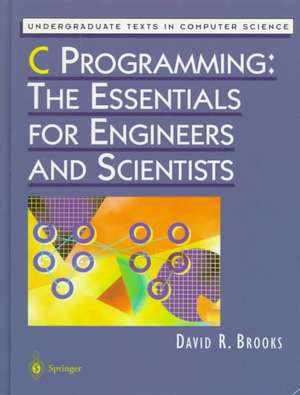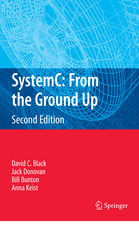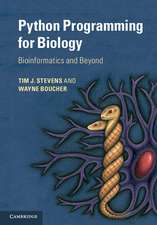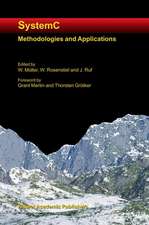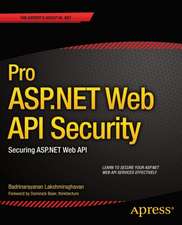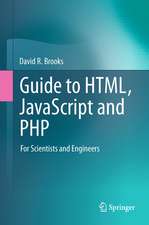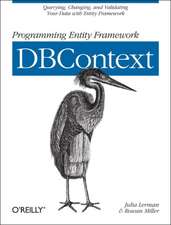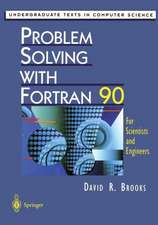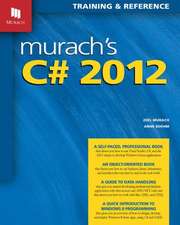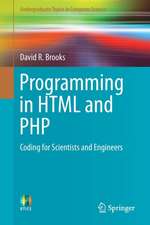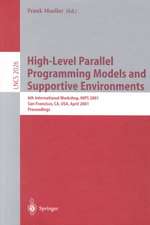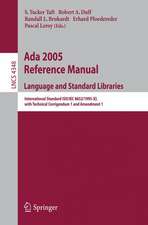C Programming: The Essentials for Engineers and Scientists: Undergraduate Texts in Computer Science
Autor David R. Brooksen Limba Engleză Hardback – 4 iun 1999
| Toate formatele și edițiile | Preț | Express |
|---|---|---|
| Paperback (1) | 427.83 lei 6-8 săpt. | |
| Springer – 30 oct 2012 | 427.83 lei 6-8 săpt. | |
| Hardback (1) | 662.48 lei 6-8 săpt. | |
| Springer – 4 iun 1999 | 662.48 lei 6-8 săpt. |
Preț: 662.48 lei
Preț vechi: 828.09 lei
-20% Nou
Puncte Express: 994
Preț estimativ în valută:
126.77€ • 132.96$ • 105.53£
126.77€ • 132.96$ • 105.53£
Carte tipărită la comandă
Livrare economică 01-15 aprilie
Preluare comenzi: 021 569.72.76
Specificații
ISBN-13: 9780387986326
ISBN-10: 0387986324
Pagini: 500
Ilustrații: XVII, 479 p.
Dimensiuni: 155 x 235 x 32 mm
Greutate: 0.89 kg
Ediția:1999
Editura: Springer
Colecția Springer
Seria Undergraduate Texts in Computer Science
Locul publicării:New York, NY, United States
ISBN-10: 0387986324
Pagini: 500
Ilustrații: XVII, 479 p.
Dimensiuni: 155 x 235 x 32 mm
Greutate: 0.89 kg
Ediția:1999
Editura: Springer
Colecția Springer
Seria Undergraduate Texts in Computer Science
Locul publicării:New York, NY, United States
Public țintă
Lower undergraduateCuprins
1 Programming Preliminaries.- 1.1 A Five-Step Problem-Solving Process.- 1.2 Defining a Pseudocode Language for Algorithm Development.- 1.3 Organizing Pseudocode Into a Program.- 1.4 Examples.- 1.5 What Is the Point of Programming?.- 1.6 Your First C Program.- 2 The Basics of C Programming.- 2.1 C Program Layout.- 2.2 Basic Input and Output.- 2.3 Reading External Text Files of Unknown Length.- 2.4 Reading a File One Character at a Time.- 2.5 Applications.- 2.6 Debugging Your Programs.- 3 Data Types, Operators, and Functions.- 3.1 Specifying and Using Data Types.- 3.2 Operators.- 3.3 Type Casting.- 3.4 Intrinsic Functions.- 3.5 Simple User-Defined Functions.- 3.6 Applications.- 3.7 Debugging Your Programs.- 3.8 Exercises.- 4 Selection and Repetition Constructs.- 4.1 Relational and Logical Operators.- 4.2 Selection (IF…THEN…ELSE…) Constructs.- 4.3 Choosing Alternatives From a List of Possibilities.- 4.4 Repetition (LOOP…) Constructs.- 4.5 Applications.- 4.6 Debugging Your Programs.- 4.7 Exercises.- 5 More About Modular Programming.- 5.1 Defining Information Interfaces in C.- 5.2 Menu-Driven Programs.- 5.3 More About Function Interfaces.- 5.4 Recursive Functions.- 5.5 Using Prewritten Code Modules.- 5.6 Using Functions as Arguments and Parameters.- 5.7 Passing Arguments to the main Function.- 5.8 Applications.- 5.9 Debugging Your Programs.- 5.10 Exercises.- 6 Arrays.- 6.1 Arrays in Structured Programming.- 6.2 One-Dimensional Array Implementation in C.- 6.3 Using Arrays in Function Calls.- 6.4 Multidimensional Arrays.- 6.5 Accessing Arrays With Pointers.- 6.6 More About Strings.- 6.8 Debugging Your Programs.- 6.9 Exercises.- 7 User-Defined Data Objects.- 7.1 Creating User-Defined Data Objects.- 7.2 Arrays of Structures.- 7.3 Functions With Structures as Parametersand Data Types.- 7.4 Applications.- 7.5 Debugging Your Programs.- 7.6 Exercises.- 8 Searching and Sorting Algorithms.- 8.1 Introduction.- 8.2 Searching Algorithms.- 8.3 Sorting Algorithms.- 8.5 Application: Merging Sorted Lists.- 8.6 Debugging Your Programs.- 8.7 Exercises.- 9 Basic Statistics and Numerical Analysis.- 9.1 Introduction.- 9.2 Basic Descriptive Statistics.- 9.3 Numerical Differentiation.- 9.4 Numerical Integration.- 9.5 Solving Systems of Linear Equations.- 9.6 Finding the Roots of Equations.- 9.7 Numerical Solutions to Differential Equations.- 9.8 Exercises.- 10 Binary Files, Random Access, and Dynamic Allocation.- 10.1 Binary and Random Access Files.- 10.2 Dynamic Allocation and Linked Lists.- 10.3 Queues and Stacks.- 10.4 Application: Managing Data From Remote Instruments.- 10.5 Exercises.- Appendices.- Appendix 1: Table of ASCII Characters for Windows/DOS-Based PCs.- Appendix 2: Program Listings by Chapter.- Appendix 3: Glossary.
